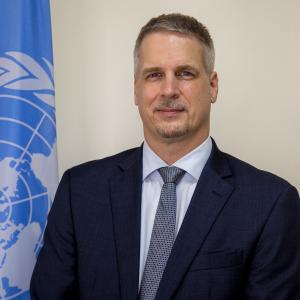Let me begin by recognizing the Government of Fiji— and especially the leadership of the Fiji Bureau of Statistics (FBoS) and the Strategic Planning Office (SPO)— for bringing us together today for this pivotal event.
It is a privilege to speak at this high-level seminar, where we aim to foster a shared understanding of the critical importance of enhancing collaboration and data sharing. By improving official statistics, we are strengthening the foundation for evidence-based policymaking.
Your ongoing commitment to building robust data systems and formulating policies based on solid evidence is not only commendable but absolutely essential for creating positive, lasting change.
I would also like to warmly acknowledge our UN partners, particularly colleagues from UNDESA and ESCAP, for their invaluable technical leadership and deep collaboration.
Let me be very clear: good data leads to good decisions, and that has never been more critical than it is today. As we navigate complex challenges and strive to achieve the SDGs, timely and reliable data is indispensable.
It forms the backbone of effective policy and planning, especially in countries like Fiji, where each decision we make can have far-reaching consequences for the lives of our people.
The UN system is proud to stand by Fiji’s side in these efforts.
The Government of Fiji, through FBoS and SPO, is taking proactive steps to enhance data systems and strengthen financing structures. The UN is aligning with these national priorities and complementing them with initiatives designed to support their success.
ESCAP, in partnership with the Pacific Community, has helped to define the essential indicators and guidance for tracking progress against the National Development Plan (NDP). Their work is laying the groundwork for a more coordinated and responsive data environment that is focused on measurable impact.
However, we must acknowledge the magnitude of the challenge ahead. In Fiji, 9 of the 17 SDGs lack at least 50% of the necessary data to assess trends. For example, SDG 5 on gender equality and SDG 16 on peace, justice, and strong institutions are missing data for 79% of their indicators.
In the Asia-Pacific region, we are currently off track to achieve the SDGs, with projections indicating that we are lagging behind by as much as 33 years. This significant gap underscores the urgent need for comprehensive data to better understand our progress and challenges. Measuring our efforts is the first critical step toward closing this gap, enabling us to make informed, targeted decisions and accelerate the pace of development to ensure that no one is left behind.
This is a powerful wake-up call, reminding us why we are here today: to move from identifying gaps to taking action, ensuring that no goal is left behind simply because we lack the data to measure progress.
At the same time, the UNDESA-led DATAS initiative, launched right here in Fiji this January, is stepping in to address these data gaps that too often slow us down.
But we must remember: this is not just about collecting numbers; it’s about improving governance, enhancing the way we share information, and learning from each other across Small Island Developing States (SIDS).
What makes the DATAS initiative stand out is that it is practical, locally driven, and designed for real impact, and I am pleased to see FBoS leading this change in a way that directly supports Fiji’s National Development Plan and Vision 2050.
These efforts are not happening in isolation—they are complementary. This is genuine partnership in action, with each initiative reinforcing the other.
Later today, I believe my colleague Andie will expand on this synergy as we move into the technical workshop.
So yes, we have the right building blocks in place—solid initiatives, committed partners, and national leadership. But what truly matters is how we connect those pieces. Progress happens when we collaborate, when ideas translate into action that transforms lives.
This seminar—and the workshop that follows—is our opportunity to strengthen those connections, to bring FBoS and SPO even closer together, and to align around a shared vision. Because, at the end of the day, it is collective clarity and momentum that will drive us forward and ensure we are making a tangible, positive change in the lives of the people we serve.
The UN Country Team is fully committed to walking this path with you. We are here to listen, support, and help bridge the gap between data, policy, and the people who rely on us.
Vinaka Vakalevu, Dhanjavaad, Thank You.




